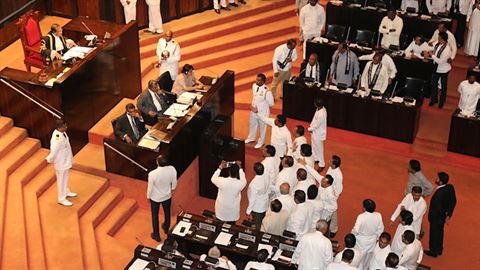COLOMBO: Sri Lanka appeared to have ground to a political halt Thursday, with the speaker of parliament saying there was no functioning prime minister or cabinet after a no-confidence vote the previous day.
Sri Lanka’s newly appointed Prime Minister Mahinda Rajapaksa sits inside the parliament during the session in Colombo, Sri Lanka November 14, 2018.
His comments came after weeks of political turmoil in the island, off the southeast coast of India, culminating in noisy chaos on the floor of parliament Thursday.
Parliament passed the no-confidence motion against recently appointed Prime Minister Mahinda Rajapaksa and his government with the backing of 122 of the 225 lawmakers in a voice vote, followed by a signed document.
But President Maithripala Sirisena, in a letter to Speaker Karu Jayasuriya, said he could not accept the no-confidence vote as it appeared to have ignored the constitution, parliamentary procedure and tradition.
“We expect the speaker to be an independent speaker and not a close friend of your party or the West,” Rajapaksa told parliament. “We want a general election.”
He also alleged the previous government led by ousted Prime Minister Ranil Wickremesinghe was corrupt.
“Since the no-confidence vote was passed yesterday, according to the constitution, the cabinet of ministers has been dissolved and no new prime minister or ministers appointed, today nobody will be accepted as prime minister or any other ministers,” Jayasuriya told parliament.
In a letter to Sirisena, the speaker justified the vote of no-confidence, saying he had been forced to hold a voice vote after his pleas for a peaceful vote were ignored.
Sirisena, who triggered the crisis by firing Wickremesinghe and naming Rajapaksa to the job late last month, dissolved parliament last week and ordered elections to break the deadlock.
But the Supreme Court ordered a suspension of that decree Tuesday until it had heard petitions challenging the move as unconstitutional.
Soon after his speech, Rajapaksa’s supporters poured on to the floor of parliament and disrupted proceedings.
Then MPs from both sides gathered close to the Speaker’s chair, with a lot of shouting and hooting.
The turmoil lasted almost 20 minutes after which Jayasuriya, failing to bring the house to order, left parliament without making any statement.
After a meeting with party leaders, Jayasuriya agreed to convene the next parliament session on Wednesday, media reported. However, Wickremesinghe loyalists said there was no such agreement.
Mahinda Samarasinghe, a Rajapaksa supporter, criticized the Jayasuriya for inviting foreign envoys to witness the proceedings, saying he was trying to destroy the perception of parliament.
Security was beefed up around the parliament and 32 ministries in capital Colombo, police said, a day after Rajapaksa and his cabinet were voted out.
Rajapaksa, under whose rule Sri Lanka achieved its 2009 victory in a decades-long conflict against rebels from the Tamil minority, is seen as a hero by many among Sri Lanka’s Buddhist majority. He has been accused by diplomats of human rights abuses during the war, which he denies.
REUTERS
